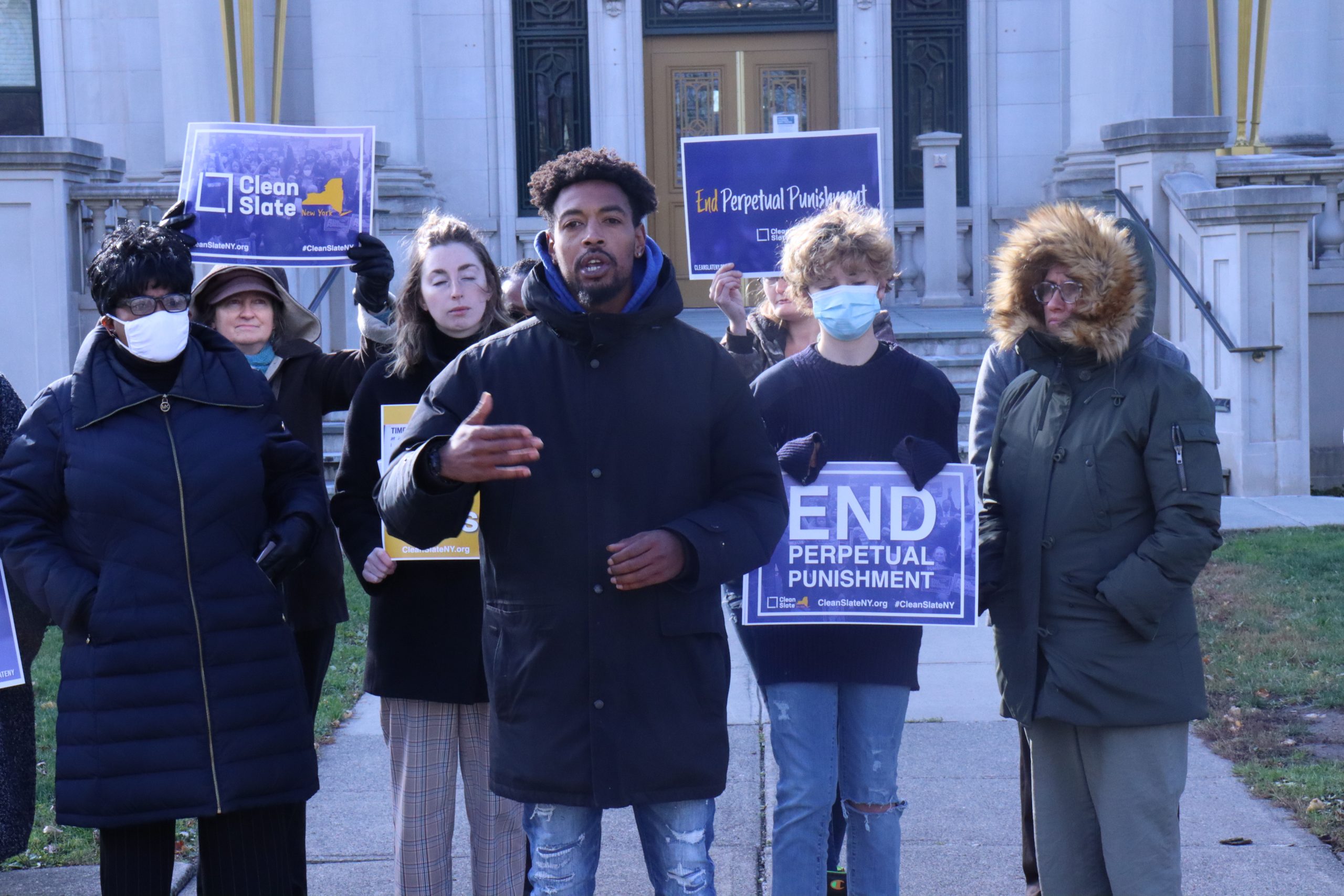
Alexis Figueroa speaks in Hudson, New York in support of the Clean Slate Act.
The Clean Slate Act (S.1553D/A.6399C) passed a Senate vote in Albany earlier this year but has yet to make to the Assembly floor. Advocates and lawmakers have recently begun a push, ahead of the new legislative session, to ensure the bill makes it to an Assembly vote and eventually Gov. Kathy Hochul’s desk.
The Clean Slate Act, sponsored by Senator Zellnor Myrie, D-Brooklyn, and Assemblymember Catalina Cruz, D-Corona, in their respective chambers, will automatically seal the criminal records of New Yorkers after a “certain passage of time” has passed from their conviction or release from parole or probation, provided they do not have a current charge pending and they haven’t been convicted of another serious crime.
Among other things, this bill is meant to make it easier for the formerly incarcerated to find employment after they are released.
On December 1, advocates and legislators rallied in several locations across the state in support of the bill’s progress through the State Legislature, hoping to continue work on the bill which passed a Senate vote June 1 this year. The bill, as of May 28, was revised and recommitted to the Assembly Codes Committee for a third time since it’s introduction to the chamber.
Since the bill’s introduction in Albany, the Republican minorities in both chambers have pushed against the bill, calling it a “threat to public safety.”
Senate Minority Leader Rob Ortt, R-North Tonawanda, said, “If passed, this legislation would pose a serious threat to public safety. Day care providers would have no way to ensure the people they hire to look after your children are not violent criminals. Landlords would have no way to ensure the person living next to you is not a violent criminal. The legislation would even seal the conviction of inmates before they were released from prison.”
These comments followed a Senate hearing on the matter the same day in 2021.
“Liberals’ platform on criminal justice isn’t simply misguided – it’s actually dangerous,” said Assembly Republican Leader Will Barclay earlier this year in January.
In Hudson, Mayor Kamal Johnson said, “Any of the pushback would be due to ignorance, not really understanding the bill. I mean this is really a push for people to get a second chance, if the prison system is really supposed to be a rehabilitation, then we have to prove that and we have to help people be able to reenergize into society.”
A 2021 report from the Brennan Center for Justice found that 43,500 new yorkers were incarcerated in prison and that roughly 337,000 new yorkers had spent time in the prison system. Often in job applications, job seekers have to fill out information that clarifies whether or not they have been convicted of a felony or served time. This information can influence a hiring company as they make a final decision to offer a job and there is still a background check that comes into play which can reveal a prior conviction.
According to Mayor Johnson the local business community in Hudson would benefit from the law. He said, “We’re looking for workers everywhere. Our hospital has over 300 positions, our business streets, our restaurants, our bars, our childcare places, everywhere needs workers.”
New York City passed a law in 2018, the Fair Chance Act, that would make it illegal to look into a job seekers criminal history until after an offer had been made. While the law doesn’t stop them from ever finding out the extent of an applier’s criminal history, it does the delay the process.
Alexis Figueroa, outreach coordinator for the Hudson Catskill Housing Coalition, has himself been incarcerated before and found that some people who had been formerly incarcerated felt unsure about applying to jobs after their release. After seeing the box that had to be ticked asking whether or not you had been convicted, he said some ended up working illegal, under the table jobs instead.
Figueroa said, “It’s discouraging, it’s discouraging to know that even when you get out and after you do your time, you do your parole, that you still don’t get a chance, you get rejected. You can end up getting a job and then they find out you have a felony or a misdemeanor after and get let go from your job.”
Assemblymember Cruz, sponsor of the bill, led a failed push to get the bill passed during the end of this year’s legislative session, but is more optimistic about 2023. She said in a recent Facebook post, “Clean Slate is about jobs, Clean Slate is about community safety, Clean Slate is about treating people with dignity. Let’s get to Albany and pass it once and for all.”









